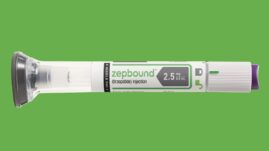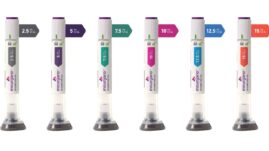Zepbound is an FDA-approved medication used for weight loss and maintenance.
The drug comes as a liquid solution inside prefilled injection pens and is usually injected once per week.
Key facts
- Zepbound (tirzepatide) is a once-weekly injectable medication in the GIP/GLP-1 receptor agonist drug class used for chronic weight management.
- Six different one-dose pens are available: 2.5 milligrams (mg), 5 mg, 7.5 mg, 10 mg, 12.5 mg, and 15 mg.
- Users typically start at a 2.5 mg dose which may increase after four weeks under medical supervision if no adverse side effects are experienced.
- Weight loss effectiveness varies by dose.
- Adverse effects like nausea, vomiting, and diarrhea are possible, especially during initial use or dose adjustments.
Table of Contents
- What is a normal Zepbound dose?
- What dose do you typically start with?
- How and when can you increase your dose?
- What is the right dose for me?
- What is the right dose for weight loss?
- What happens if I stop taking Zepbound?
- Are there different Zepbound pens?
- What do I do if I forget to take my dose?
- What to do in case of a Zepbound overdose
- How do I store Zepbound?
What is a normal Zepbound dose?
The appropriate maintenance dose of Zepbound varies from one person to another, largely based on their response to the medication and how well they tolerate it.
Zepbound is available in several dosage strengths:
- 2.5 mg (the recommended starting dose)
- 5 mg
- 7.5 mg
- 10 mg
- 12.5 mg
- 15 mg
Each dose is administered once weekly, preferably on the same day and time each week, and can be taken with or without food.
The maintenance dose, which is the regular dose used after the starting period, generally ranges from 5 mg to 15 mg once per week.
The process of finding the right maintenance dose involves gradual dose increases from the starting dose, guided by tolerance of and response to the medicine, under the strict supervision of a doctor or other healthcare provider.
What dose do you typically start with?
If you’re new to Zepbound, your doctor will want to start you on a low dose.
This is because the medication may cause adverse side effects, including:
- nausea
- vomiting
- diarrhea
- constipation
- low blood sugar (particularly if you also take insulin or medicines that stimulate the release of insulin, like sulfonylureas).
These symptoms usually go away after a few weeks, but taking a lower dose when you begin treatment can help prevent them altogether.
According to the manufacturer, a typical starting dose is 2.5 mg, taken once per week.
If you’re tolerating the medicine well without adverse side effects, your doctor may increase your dose after the first four weeks — but not before.
How and when can you increase your dose?
Based on your response and tolerability, and in consultation with your doctor, you may increase your dose in 2.5 mg increments every four weeks.
For many people, a maintenance dose of 5 mg weekly is effective. However, if further weight management is needed and the medication is well-tolerated, incremental increases to 7.5 mg, 10 mg, 12.5 mg, or ultimately up to the maximum of 15 mg once weekly may be considered.
It’s important to only consider dose increases if there are no significant negative side effects and the treatment outcomes are not yet achieved. Always consult with your doctor before making any changes to your dosing regimen.
What is the right dose for me?
Determining the right dose involves a collaborative effort between you and your healthcare provider.
Dosing is tailored based on your response and tolerability, to find the most effective dose that minimizes side effects.
While higher doses may increase weight loss for some people, they can also increase the likelihood of side effects, particularly during the adjustment phase.
Always stick to the dosing regimen prescribed by your healthcare provider, and never take more than the recommended dose of Zepbound. Any changes to your dose should only be made under medical supervision.
What is the right dose for weight loss?
There is no ideal dose for weight loss — weight loss has been documented at multiple levels of dosing, aside from the initial starting dose (which most people do not use as their maintenance dose).
In a pivotal study published in The New England Journal of Medicine in 2022 of more than 2,500 adults, weight loss was observed at the 5-mg, 10-mg, and 15-mg doses.
At week 72 of the study, on average, those taking 5 mg per week had lost 15 percent of their starting weight, those taking 10 mg per week had lost 19.5 percent of their weight, and those taking 15 mg per week had lost 20.9 percent of their weight.
In contrast, the placebo (inactive treatment) group at week 72 had only lost an average of 3.1 percent of their weight.
Learn more in: Can Zepbound Help You Lose Weight?
What happens if I stop taking Zepbound?
Do not stop taking any medications without the guidance of your doctor.
After stopping Zepbound, many people will regain lost weight and may experience higher blood sugar levels from increased insulin resistance and hunger.
If you wish to stop taking Zepbound, your doctor will likely taper your dose to lessen the side effects as the medication leaves your system.
Talk with your doctor if you are experiencing severe adverse side effects, Zepbound doesn’t fit into your lifestyle, or your health insurance doesn’t cover the medication and you wish to stop taking it.
Your doctor may be able to suggest a suitable alternative.
Are there different Zepbound pens?
Yes — Zepbound is available in six different single-dose pens. This can help reduce the risk of dosing errors.
The pens are available in the following strengths:
- 2.5 mg
- 5 mg
- 7.5 mg
- 10 mg
- 12.5 mg
- 15 mg
If you need to increase your dose, you will need a new prescription from your doctor.
What do I do if I forget to take my dose?
Remember to take your dose on the same day each week, at generally the same time (for example, before breakfast or dinner).
If you miss a dose of Zepbound, take it as soon as possible within four days (96 hours) of your missed dose.
If you miss a dose for more than four days, skip that week and continue taking your Zepbound on your regular schedule the following week.
Do not take two Zepbound doses within three days of each other.
Missing one dose will not make you gain weight.
What to do in case of a Zepbound overdose
Never take more Zepbound than you are prescribed.
If you overdose on Zepbound or take two doses within the same week, you may experience severe side effects, including nausea, vomiting, and low blood sugar, which can be life-threatening (especially if you’re also on insulin.)
Monitor for signs and symptoms of extremely low blood sugar, which include:
- Dizziness
- Confusion
- Increased heart rate
- Shallow breathing
- Shakiness
- Grogginess
- Fatigue
- Unconsciousness
Seek emergency medical attention immediately if you suspect you’ve overdosed on Zepbound.
If you live in the United States, you can also call America’s Poison Centers at 800-222-1222 or use its online tool.
If you have severe overdose symptoms, immediately call 911 or your local emergency number or go to the nearest emergency room.
How do I store Zepbound?
Store Zepbound at a temperature between 36 and 46 degrees Fahrenheit (2 and 8 degrees Celsius).
Ensure that Zepbound gets no hotter than 86 degrees Fahrenheit (30 degrees Celsius).
Never freeze your pens.
Zepbound can be left unrefrigerated for up to 21 days if the temperature never exceeds 86 degrees Fahrenheit (30 degrees Celsius). Do not refrigerate your pens if you’ve been keeping them at room temperature.
Keep your Zepbound pens in their original packaging to protect them from light and ensure their integrity. Always store medications out of reach of children to ensure safety.
Suggested next article: Everything You Need to Know About Zepbound.






David
Zepbound has been a Godsend to me. For years, I’ve been obese, sometimes onthe
Libby
I do not have drug prescription coverage at all for 2024.
I’m on Medicaid. MEDICAID DOES NOT COVER MY DRUGS.
Why can I get a savings card?